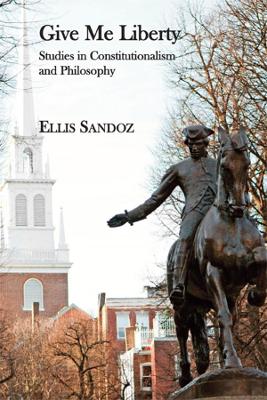Eric Voegelin Society Studies
1 total work
Give Me Liberty - Studies in Constitutionalism and Philosophy
by Ellis Sandoz
Published 15 June 2013
The Liberty for which Patriot Patrick Henry was willing to die was more than a rhetorical flourish. The American Patriots and Founders based their ideas about Liberty upon almost 200 years of experience on their own as well as the heritage of English Common Law and even back to the natural order of Thomas Aquinas, not to mention the philosophy of Aristotle and the Biblical Exodus of the Israelites from Egypt.
In over 50-years of scholarship Ellis Sandoz has researched, documented and contemplated the governance of man throughout the ages. The erudition brought to bear in this compact tome reflects a depth and breadth of learning that illuminates the subject with dazzling insight. Yet, he always reminds us that principles of Liberty are readily comprehensible to the common man. Sandoz worries that the present day adherence to political correctness limits our response to obviously murderous terroristic movements. He attacks academia for ignoring the spiritual nature of existence and events. He even chastens "social dogoodism" when it is provided instead of, rather than as a reflection of, spiritual nourishment.
The book revolves around the motivation and context of the American Founding and drives home its relevance to contemporary living. The Founders fought against tyranny that attempted to control their physical and spiritual lives. Unjust governance was deemed to be without authority. Aristocrats and commoners ultimately must answer to the Final Authority. These concepts are reflected in the Declaration of Independence: "all men are created equal and they are endowed by their Creator with certain unalienable rights - that among these are life, liberty and the pursuit of happiness." Sandoz is not only a scholar, but a grandfather; his words will engender Liberty for future generations.
In over 50-years of scholarship Ellis Sandoz has researched, documented and contemplated the governance of man throughout the ages. The erudition brought to bear in this compact tome reflects a depth and breadth of learning that illuminates the subject with dazzling insight. Yet, he always reminds us that principles of Liberty are readily comprehensible to the common man. Sandoz worries that the present day adherence to political correctness limits our response to obviously murderous terroristic movements. He attacks academia for ignoring the spiritual nature of existence and events. He even chastens "social dogoodism" when it is provided instead of, rather than as a reflection of, spiritual nourishment.
The book revolves around the motivation and context of the American Founding and drives home its relevance to contemporary living. The Founders fought against tyranny that attempted to control their physical and spiritual lives. Unjust governance was deemed to be without authority. Aristocrats and commoners ultimately must answer to the Final Authority. These concepts are reflected in the Declaration of Independence: "all men are created equal and they are endowed by their Creator with certain unalienable rights - that among these are life, liberty and the pursuit of happiness." Sandoz is not only a scholar, but a grandfather; his words will engender Liberty for future generations.
